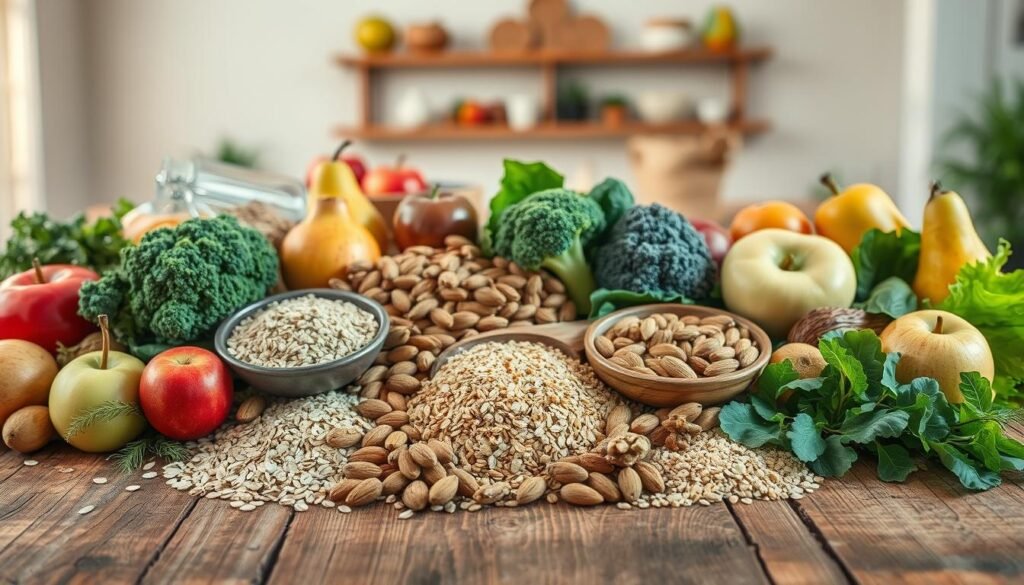Keeping your circulatory system healthy is key to feeling good. A big part of this is preventing heart disease by what you eat. Eating foods that are good for your heart can help clean up your heart and make your arteries clear.
Eating foods that are good for your heart can make your circulatory system healthier. The right foods can keep your arteries in good shape. This lowers your risk of heart problems.
Choosing the right foods can help you keep your circulatory system healthy. This not only makes you feel better now but also helps you stay healthy for a long time.
Key Takeaways
- Incorporate nutrient-rich foods to support heart health.
- A natural diet can help prevent heart disease.
- Certain foods can aid in cleansing the heart.
- A healthy circulatory system is vital for overall well-being.
- Dietary choices play a significant role in maintaining clear arteries.
Understanding Heart Disease Prevention
Keeping your heart healthy is key to feeling good overall. Knowing how to stop heart disease is a big step towards this goal. Heart disease includes many conditions that harm the heart’s structure and function. If not managed, these can lead to serious health problems.
The Importance of a Healthy Heart
A healthy heart is vital for pumping blood well. It supplies oxygen and nutrients to our bodies and takes away waste. The heart’s health is tied to our overall heart health. Keeping it in good shape is crucial for avoiding heart disease.
Risk Factors for Heart Disease
Many things can increase your chance of getting heart disease. High blood pressure, high cholesterol, smoking, diabetes, obesity, and a family history of heart disease are some. Knowing these risk factors helps us take steps to prevent it.
How Diet Impacts Heart Health
What we eat greatly affects our heart health. Eating lots of fruits, vegetables, whole grains, and lean proteins can help prevent heart disease. On the other hand, a diet full of saturated fats, sodium, and cholesterol can raise the risk. Our diet influences our blood pressure, cholesterol levels, and weight, all important for heart health.
| Dietary Component | Effect on Heart Health |
|---|---|
| Fruits and Vegetables | Rich in antioxidants, fiber, and potassium, helping to lower blood pressure and cholesterol levels. |
| Whole Grains | High in fiber, which can help lower cholesterol levels and improve heart health. |
| Saturated and Trans Fats | Can increase cholesterol levels and the risk of heart disease. |
The Role of Nutrition in Cardiovascular Health
Eating the right foods can help clean your heart and arteries. This makes your circulatory system healthier. Nutrition is key to keeping your heart and blood vessels in top shape.
Essential Nutrients for Heart Health
A diet full of essential nutrients is crucial for heart health. Omega-3 fatty acids, antioxidants, and fiber are important for your heart. Omega-3s, found in fish and nuts, lower inflammation and boost heart health. Antioxidants in fruits and veggies fight off free radicals that harm heart tissue.
Dr. Smith, a cardiologist, says, “Eating lots of fruits, veggies, and whole grains can lower heart disease risk.” Adding these foods to your diet can greatly improve your heart health.
Foods to Avoid for Clear Arteries
Some foods are good for your heart, while others are not. Foods high in saturated fats, sodium, and added sugars can clog arteries and raise heart disease risk. It’s important to limit or avoid these foods for clear arteries.
Bad foods include processed meats, fried foods, and baked goods. These foods are low in nutrients and high in harmful substances that can harm your heart and arteries.
The Impact of Processed Foods
Processed foods are bad for your heart because they’re full of unhealthy stuff. Preservatives, artificial flavorings, and too much sodium are common in these foods. Cutting down on processed foods is a big step towards a healthy heart.
By choosing whole, nutrient-rich foods and cutting down on unhealthy ones, you can greatly improve your heart health. This reduces your risk of heart disease.
Heart-Healthy Foods to Include in Your Diet
Eating the right foods can help keep your heart healthy. A diet full of essential nutrients can prevent heart disease. It also supports your body’s natural healing.
Fruits and Vegetables for Optimal Heart Function
Fruits and vegetables are full of vitamins and minerals. They are great for your heart. They have fiber, potassium, and antioxidants that lower blood pressure and cholesterol.
Leafy greens, berries, and citrus fruits are especially good. Spinach, kale, blueberries, strawberries, oranges, and grapefruits are all heart-friendly.
Whole Grains: A Foundation for Healthy Eating
Whole grains are packed with fiber, vitamins, and minerals. They are key for heart health. They help lower cholesterol and control blood sugar.
Good whole grains include oats, quinoa, brown rice, and whole-wheat bread. They are all great for your heart.
Nuts and Seeds: Small But Mighty
Nuts and seeds are full of healthy fats, protein, and fiber. They are excellent for heart health. They also have antioxidants that lower cholesterol.
Almonds, walnuts, chia seeds, and flaxseeds are top choices. They are all good for your heart.
| Food Group | Examples | Benefits for Heart Health |
|---|---|---|
| Fruits and Vegetables | Leafy greens, berries, citrus fruits | Rich in fiber, potassium, and antioxidants; can help lower blood pressure and cholesterol levels |
| Whole Grains | Oats, quinoa, brown rice, whole-wheat bread | Rich in fiber, vitamins, and minerals; can help lower cholesterol levels and regulate blood sugar levels |
| Nuts and Seeds | Almonds, walnuts, chia seeds, flaxseeds | Rich in healthy fats, protein, and fiber; can help lower cholesterol levels and provide antioxidants |
The Power of Omega-3 Fatty Acids
Omega-3 fatty acids are key to cleaning up heart health. They reduce inflammation and help with emotional healing. These fats are vital for a healthy heart and overall health.
Best Sources of Omega-3s
Many foods are rich in omega-3s. Fatty fish like salmon, mackerel, and sardines are top choices. For plant-based options, flaxseeds, chia seeds, and walnuts are great. You can also take omega-3 supplements if you can’t eat these foods.

How Omega-3s Benefit Heart Health
Omega-3s are good for the heart in many ways. They lower triglycerides, blood pressure, and prevent blood clots. They also reduce body inflammation, which helps prevent heart disease. Adding omega-3s to your diet can greatly improve heart health and lower disease risk.
Incorporating Omega-3s Into Your Meals
It’s easy to add omega-3s to your meals. Eat fatty fish like salmon a few times a week. Grill it for dinner or add sardines to salads. For plant-based options, sprinkle flaxseeds on oatmeal or yogurt, or snack on walnuts. Omega-3 foods can easily become part of your daily meals, boosting heart health and overall well-being.
The Impact of Whole Grains on Heart Health
Whole grains are great for your heart. They help clean your heart and heal from the inside. They are full of nutrients, fiber, and antioxidants. These are key for a healthy heart.
Understanding Different Types of Whole Grains
Whole grains include foods like oats, quinoa, brown rice, and whole wheat. Each one has its own special benefits. For example, oats have a lot of soluble fiber. This fiber can lower your cholesterol.
Nutritional Benefits of Whole Grains:
| Whole Grain | Nutritional Benefit |
|---|---|
| Oats | High in soluble fiber, aiding in cholesterol reduction |
| Quinoa | Complete protein source, rich in minerals and antioxidants |
| Brown Rice | Rich in manganese, selenium, and magnesium |
| Whole Wheat | High in fiber, vitamins, and minerals |
How Whole Grains Help Lower Cholesterol
Whole grains, especially those with soluble fiber like oats and barley, can lower bad cholesterol. Soluble fiber turns into a gel in your stomach. This gel traps bile acids and removes them, which lowers liver cholesterol production.
Delicious Whole Grain Recipes
Adding whole grains to your meals can be tasty and simple. Try a quinoa salad with roasted veggies or a warm oatmeal with fruits and nuts. These dishes are not only yummy but also good for your heart.
For a quick, healthy breakfast, try whole grain toast with avocado and an egg. Or, have a bowl of brown rice porridge with cinnamon and honey.
The Importance of Fiber in Heart Disease Prevention
Dietary fiber is crucial for heart health. It helps keep your heart and arteries healthy. Eating foods high in fiber supports digestion and heart health.
Types of Fiber and Their Benefits
There are two main types of dietary fiber: soluble and insoluble. Soluble fiber turns into a gel in water, which lowers cholesterol. This reduces heart disease risk. Foods like oatmeal, barley, nuts, and fruits are good sources.
Insoluble fiber helps move food through your digestive system. It aids in regular bowel movements. Whole grains, vegetables, and wheat bran are rich in this type of fiber.
Fiber offers many benefits, including:
- Lowering cholesterol levels
- Regulating blood sugar levels
- Promoting satiety and weight management
- Supporting healthy gut bacteria
Best Sources of Dietary Fiber
Eating a variety of fiber-rich foods is key. Some top sources are:
- Fruits such as apples, bananas, and berries
- Vegetables like broccoli, carrots, and Brussels sprouts
- Legumes, including beans, lentils, and peas
- Whole grains like brown rice, quinoa, and whole-wheat bread
- Nuts and seeds, such as almonds, chia seeds, and flaxseeds

Tips for Increasing Fiber Intake
To get enough fiber, aim for 25-30 grams daily. Here are some tips:
- Start your day with a high-fiber breakfast, such as oatmeal with fruits and nuts.
- Add more fruits and vegetables to your meals and snacks.
- Switch to whole grains instead of refined ones.
- Snack on nuts and seeds.
- Slowly increase your fiber intake to let your body adjust.
By following these tips, you can boost your heart health. This reduces the risk of heart disease. It also helps in healing the heart and forgiveness for past diet choices.
Meal Planning for Heart Health
Heart health starts with what you eat. Meal planning is key to a healthy lifestyle. Eating nutrient-dense foods and balanced meals can lower heart disease risk.
Creating a Balanced Heart-Healthy Meal
A balanced meal has foods from different groups. Vegetables, fruits, whole grains, lean proteins, and healthy fats are essential. Try to have a variety of colors on your plate for more nutrients.
For example, a healthy dinner could be grilled salmon, roasted veggies, and quinoa. Salmon is full of omega-3s, veggies add fiber, and quinoa provides protein and fiber.
Snacks That Support Heart Wellness
Snacks keep your energy up and support health. Pick snacks that are nutrient-rich but low in added sugars, salt, and unhealthy fats.
- Nuts and seeds (such as almonds and chia seeds)
- Fresh fruits and vegetables (carrot sticks with hummus)
- Whole grain crackers with avocado or peanut butter
Understanding Portion Control
Controlling portions is crucial for a healthy weight and preventing heart strain. Use measuring cups or a food scale to measure your portions.
| Food | Recommended Serving Size | Tips |
|---|---|---|
| Nuts and Seeds | 1 ounce (about a handful) | Choose unsalted and unsweetened options |
| Whole Grains | 1/2 cup cooked | Opt for brown rice, quinoa, and whole wheat |
| Lean Proteins | 3 ounces (size of a deck of cards) | Grill, bake, or broil instead of frying |
By following these meal planning tips, you can improve your heart health and overall well-being.
The Benefits of the Mediterranean Diet
The Mediterranean diet is known for its heart health benefits. It includes lots of fruits, vegetables, whole grains, and healthy fats. These foods help lower the risk of heart disease.
This diet focuses on whole, unprocessed foods. Eating these foods can greatly improve heart health.
Key Components of the Mediterranean Diet
The Mediterranean diet is packed with heart-healthy foods. These include:
- High intake of fruits and vegetables
- Whole grains as a staple
- Healthy fats, such as those found in olive oil
- Moderate consumption of fish and poultry
- Low intake of red meat and processed foods
How This Diet Promotes Heart Health
The Mediterranean diet helps heart health in many ways. It lowers cholesterol, reduces blood pressure, and prevents blood clots. All these are risk factors for heart disease.
Reducing inflammation is another key benefit. The diet’s antioxidants and omega-3 fatty acids fight inflammation. This is important for preventing heart disease.
Easy Mediterranean Recipes to Try
Adding the Mediterranean diet to your life can be tasty and easy. Here are some simple recipes to start with:
- Grilled salmon with roasted vegetables
- Lentil soup with olive oil
- Salad with mixed greens, cherry tomatoes, and feta cheese, topped with lemon vinaigrette
These dishes show off the Mediterranean diet’s flavors. They also highlight its focus on healthy, whole foods for heart health.
The Role of Hydration in Heart Health
Drinking enough water is more than just staying hydrated. It’s key for a healthy heart. Proper hydration is crucial for heart health, affecting blood flow and heart function.
How Water Affects Circulation
Water helps keep blood the right thickness for flowing well. Dehydration can lead to decreased blood volume. This makes the heart work harder, leading to fatigue and dizziness.
Hydration Tips for Heart Health
To keep your heart healthy, follow these hydration tips:
- Drink at least 8-10 glasses of water a day, depending on how active you are and where you live.
- Check your urine color; it should be pale yellow if you’re drinking enough water.
- Avoid sugary drinks that can dehydrate you and harm your heart.
- Eat hydrating foods like watermelon and cucumbers.
Healthy Beverage Choices
While water is best, other drinks can also help you stay hydrated. Try:
- Herbal teas for their antioxidants and hydration without sugar.
- Low-fat milk for calcium and vitamins that support heart health.
- 100% fruit juices in small amounts because of their natural sugar.
Understanding hydration’s role in heart health helps you make better choices. This proactive approach supports a healthy circulatory system. It also aids in emotional healing and inner healing through a balanced lifestyle.
Lifestyle Changes to Complement Your Diet
Starting a heart-healthy diet is a big step towards a healthy heart. But, it’s not the only thing you need to do. To really take care of your heart, you should also make other lifestyle changes.
Exercise for a Healthy Heart
Being active is key for a healthy heart. It helps your heart and improves your overall health. Try activities like brisk walking or cycling to lower blood pressure and boost circulation.
Stress Management Techniques
Too much stress can harm your heart. Using stress-reducing methods like meditation or yoga can help. These practices help you forgive and live a healthier life.
Regular Health Screenings
Getting regular health checks is important. They help find heart problems early. By doing this, you can keep your heart healthy and avoid heart disease.



